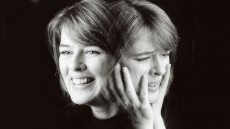Ashleigh Giffen, an 18-year-old Level One Arts Club LEAP (Learning Early About Playwriting) student, spent the past year commuting from her home in Squamish to Vancouver’s Arts Club Theatre Company in order to write her new play Still Waters (originally titled Kam Watan Nipe: Quiet Waters).
The script, centred on missing and murdered Aboriginal women, struck a chord with LEAP Program Leader Shawn Macdonald and Arts Club Education Coordinator Kevan Ellis, who continued to seek ways to support its development.
“Each year, LEAP scripts are given public readings by professional actors here at the Arts Club,” says Ellis, “But following the Vancouver presentation in April of this year, Ashleigh really wanted to keep working on a new draft and have a reading of it in her own community. Typically, our involvement on LEAP scripts ends once classes are complete, but once she brought the idea forward, it was amazing to see the momentum of support from both the Arts Club and by her local Squamish Band council.”
Arts Club Artistic Managing Director Bill Millerd adds: “As LEAP approaches its 10th anniversary, we are thrilled with the impressive growth under the direction of Shawn Macdonald. The reading of Ashleigh’s play is an important step in our commitment to encouraging playwrights from diverse communities to share their stories.”
“My community has made many strides in working towards reconciliation, and the First Nations community has done amazing things to showcase culture and healing,” says Giffen. “The Squamish people mean a lot to me, and through them I have met many incredible, powerful leaders, who have been an inspiration to me in writing a play about our murdered and missing women. I want to go beyond the mold of how people perceive Aboriginal people, but I feel it’s important to bring focus to the issues that are still happening today. Doing this locally, for me, is just the beginning.”
Still Waters will receive a public reading in Squamish on September 10, at 7 PM. Young artists interested in applying for the Arts Club’s 2016 LEAP program have until October 31 to apply. Application details: artsclub.com/participate/leap
Photo by Mark Halliday





